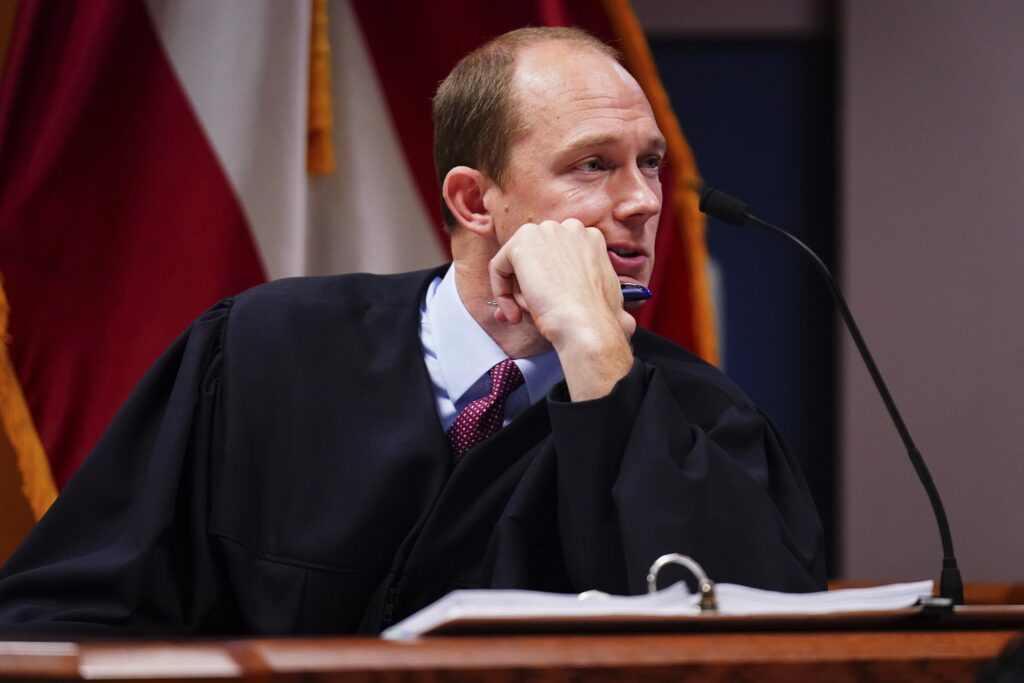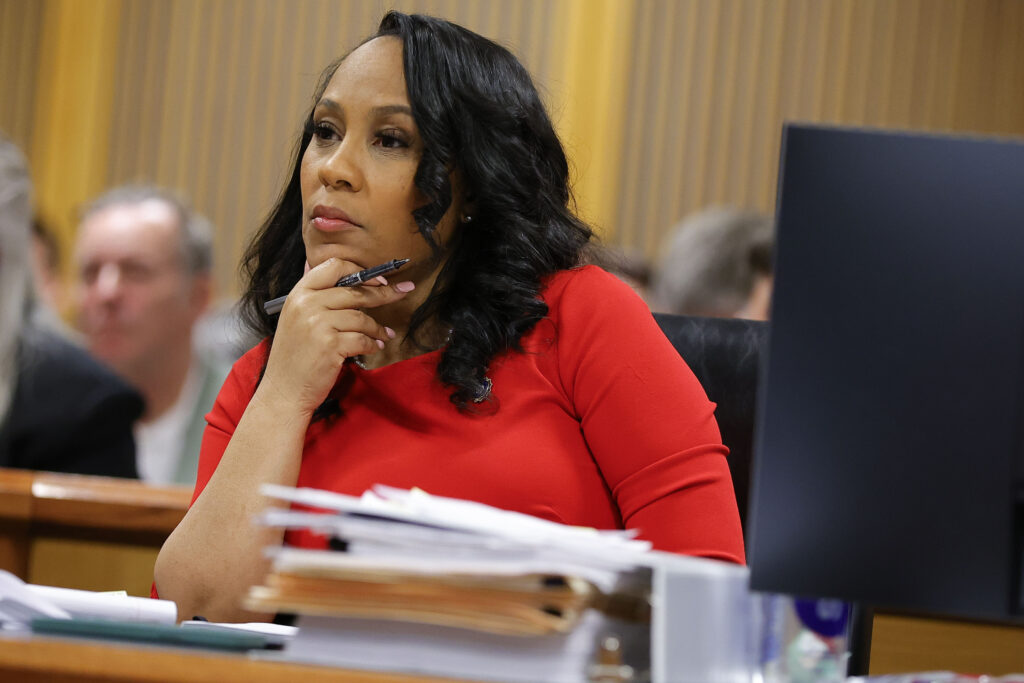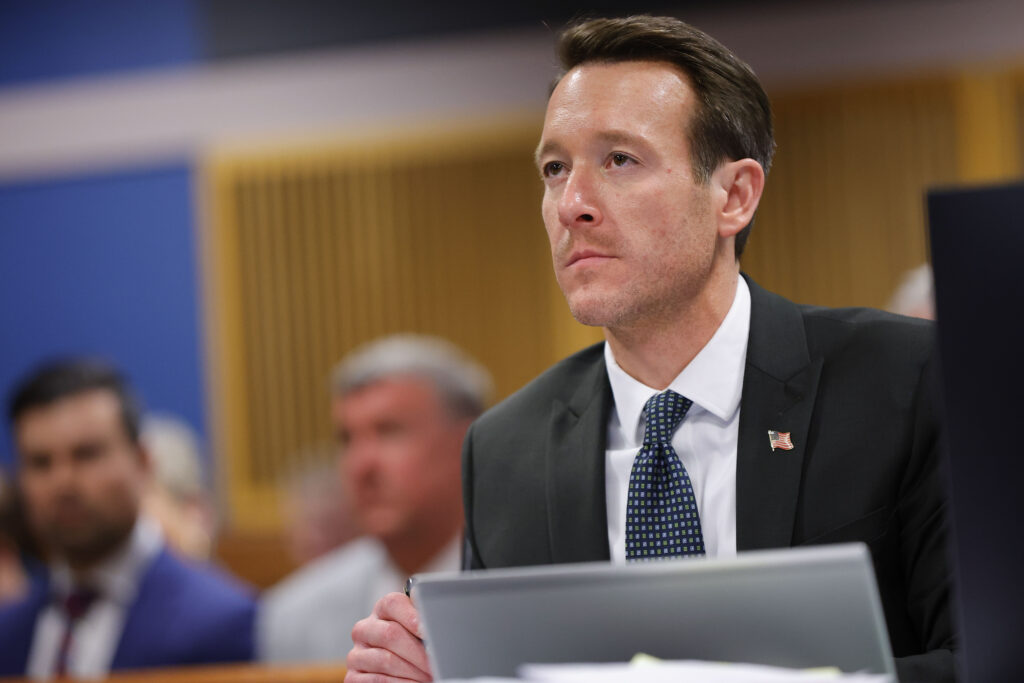
A hearing over whether to disqualify Fulton County District Attorney Fani Willis from former President Donald Trump‘s 2020 election interference case in Georgia concluded Friday with a judge signaling he will rule on the dispute within the next two weeks.
Superior Court Judge Scott McAfee spoke briefly from the bench after both defense attorneys and lawyers for the district attorney’s office wrapped up their closing arguments, which lasted nearly three hours.

“There are several legal issues to sort through, several factual determinations that I have to make,” McAfee said. “Those are ones I can’t make at this moment. And so I will be taking the time to make sure that I give this case full consideration.”
One of Trump’s co-defendants, Michael Roman, was the first to allege that Willis and special prosecutor Nathan Wade engaged in a romantic relationship, claiming in a January motion that she improperly benefited from it when he paid for several vacations the pair took together. Roman’s counsel also claimed that the relationship began before she hired him to lead the case in early November 2021. The prosecutors admitted in a court filing that they did have a personal relationship but said it started in 2022.
Defense and prosecutors spar in closing arguments
Both Willis and Wade, who have denied wrongdoing, were in attendance for the lengthy closing arguments, and both at times could be seen gently swaying in their chairs as attorneys made their final pleas to the judge.
John Merchant, Roman’s attorney, told the judge that the defense had presented facts that fit into two categories of disqualification: conflict of interest and forensic misconduct, the latter of which includes false testimony. They contend that McAfee need not find a direct conflict to disqualify Willis but that merely the “appearance” of a conflict would meet the threshold under Georgia law.

In an effort to prove that the relationship started before November 2021, defense lawyers had tapped witnesses, including Wade’s former law partner and divorce attorney, Terrence Bradley, and former district attorney’s office staffer Robin Yeartie.
Defense lawyers argued Friday that there is roughly $9,200 that Wade spent on vacations for himself and Willis that is unaccounted for. The defense attorneys noted there is no paper trail to back Willis’s assertion that she paid Wade back in cash.
Adam Abbate, a prosecutor in the Fulton County district attorney’s office, rebuked the defense’s claims, saying they failed to back them up with hard evidence.
“You heard from [Bradley’s] own testimony here, sitting before the court,” Abbate said. “All he did was speculate. Mr. Bradley impeached no one.”

“It’s ridiculous, it’s absurd, and it’s desperate,” Abbate said of the motion to dismiss. “It’s a desperate attempt to remove a prosecutor from a case for absolutely no reason, your honor, other than harassment and embarrassment.”
In another effort to demonstrate that Willis often kept cash around her house to cover expenses, prosecutors on Tuesday filed an affidavit from Stan Brody, who worked at a winery in Napa, California, that she and Wade visited last year. Brody said Willis paid $400 in cash for two bottles of wine and a tasting.
After Roman’s motion in January, McAfee felt compelled to hold hearings earlier this month to hear testimony on the matter as he mulled whether Willis should be disqualified from prosecuting the 2020 election interference case.
“Your Honor, this motion should be denied because the legal requirements required in order for the district attorney to be disqualified have not been satisfied,” Abbate said. “The defendants have failed to raise any issue legally or factually to satisfy the legal standard for disqualification, but they must show an actual conflict.”
McAfee floats disciplinary action for prosecutors
While it was not immediately clear whether McAfee would grant the motion to dismiss Willis, he suggested at one point on Friday that if it turns out Wade and Willis lied from the witness stand about their relationship, the solution could be professional disciplinary action at the state bar.
“Where in the law do we find the remedy to an untruthful statement?” McAfee asked the defense team on Friday. “Generally, we send you down the street to the bar.”
Trump attorney Steve Sadow argued to McAfee that prosecutors should be held “to a higher standard” and that a finding of any dishonesty should be grounds for Willis’s dismissal from the case.
More defense motions could be forthcoming
At the start of the hearing, the defense also suggested that it may want to introduce more evidence to support its claims, but the judge said it could not cite the new evidence during the closing arguments because prosecutors had yet to see it.
It was unclear on Friday what the new evidence entails.
However, a voicemail surfaced Friday in which a waiter claimed he had seen Bradley and Wade dining together weeks earlier at a restaurant.
CLICK HERE TO READ MORE FROM THE WASHINGTON EXAMINER
The waiter purportedly saw Wade at lunch with Bradley “about five weeks ago,” according to copies of audio messages obtained by the Megyn Kelly Show. Such claims could be relevant to the defense because Bradley testified that he had not met with Wade in two years.
The Washington Examiner has not independently verified the validity of the waiter’s claim that Wade and Bradley met in recent weeks.
Two sources familiar with the defense’s legal strategy told the Washington Examiner they weren’t yet certain whether the defense would file a supplemental motion about the alleged encounter with Wade and Bradley.





